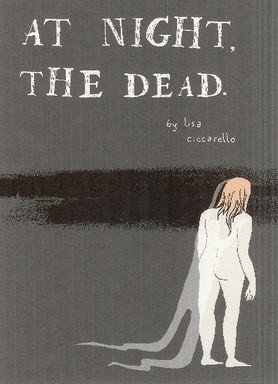At night, the dead by Lisa Ciccarello At night, the dead
|  |
“You lock the door. You lock the window. You dream of the dead.”
Most of us fear the dead. We fear their reach from beyond, their spectral presence in the dark, looming over us while we sleep, the awful things they might do. After reading Lisa Ciccarello’s prize winning chapbook, At night, the dead, published by Blood Pudding Press, it becomes clear that, though the dead are most certainly here, they are not here to do us harm. Rather, they love us, “the dead whose love is just a little series of letters.” They would like to be remembered, and maybe to have a voice.
“We are supposed to house the dead in our mouths, but we let them stay in our throats when we sing.”
The dead, it seems, seek a voice. In the dual role of poet and medium, Ciccarello chooses not only to house the dead in her mouth, but to sing:
“I am the dead I am the dead
I am the dead. The song I know.”
The mouth is the entryway, the tunnel through which the dead find their voice. Ciccarello’s haunting lyrics–surreal, pensive, often mysterious– linger in our psyche, long after they have provided the release the dead are seeking.
Just as mortals, having seen a ghost, will question their own vision, so readers of At night, the dead may question what is real and what is Ciccarello’s fantastic imagination. “The dead put their fingers in your mouth,” the narrator asserts. Despite the next line, “You are dreaming,” you will soon question whether you, the reader, are awake or asleep, whether there are fingers in your mouth or not. Ciccarello’s stream of consciousness prose poems lull you into a sort of waking sleep-walk. In time, we (readers) take on a spectral form, hovering over each poem, studying it as the dead study the living when “you are asleep & inside the dream the dead rise up & their bodies are gone but their love has a form & they come to love you but it isn’t a dream…”
Like the dead, we become ghosts, floating through each piece, accepting it’s improbability for ethereal truth.
“I want to keep telling you about the dead,” the narrator says. “They write the same word over and over again.” Ciccarello does not write the same word over and over again, though there is a ghostly echo to the repeating clues she gives us in each of these sixteen poems.
Indeed, taken as a whole, the collection is a tightly woven tapestry of encounters with the dead, stitched together by recurring threads: salt on widow sills, luminous coins, burned paper, house and home. Comprised mostly of prose poems, each piece links almost imperceptibly to the next, most often through these cleverly repeated images.
Coupled with Ciccarello’s skill at crafting poems that read like small prayers or incantations, such repetition serves not to keep the dead at bay, but to welcome them, honor and invite them into “the house they remember” and give them “Everything they ever wanted: the window view, soap that floats, someone pressing down hard. Lips made out of paper. A smile that shines (just a flame at his mouth & so what).”
“We want to remember what was so close to our faces,” the narrator tells us. Too, “the dead/ remember;/ yea & it is not enough.” As Ciccarello’s haunting narrative continues in its melodic refrain, such surreal reasoning begins to make sense. “Our home is full of beautiful boy & come on girl.” The dead “have a home in the ground, but they forget.” Is it possible the dead are us? You and I, questing readers?
Without doubt, the dead are a metaphor for something. Just what is elusive, so we must continue to read and look for clues. In providing such mysterious little gems, Ciccarello—poet, medium, mouth-piece for the dead–does not disappoint. The sheer lyricism of her language can make a clue out of a seemingly irrelevant detail. Take for instance, this gorgeous morsel of truth: “Here is how I control my heart: I string each thought sparkling behind the next. In the patient necklace each will be touched.”
Overall, At night, the dead is a haunting collection, though not in the traditional sense of ghosts and fear. Instead, it is a series of surreal linked vignettes, brief but memorable encounters with the elusive dead (who may or may not be you and I), ferrying a message that may or may not come clear as the final poem exhales its last syllable.
Do not be surprised, when, after you have finished that last poem, you find yourself going about your own days and nights trying to discover your own dead and what they are asking for. Do not be afraid “when the salt is gone the dead touch your mouth.”
Reviewed by Jill Crammond Wickham.
Poets’ Quarterly | October 2009.